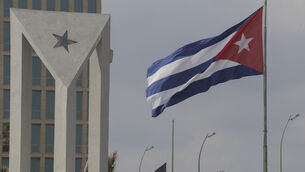Irish Examiner view: US shamed by malicious Ryder Cup spectators

FORE GOOD: Shane Lowry, of Team Europe, makes his putt to halve the hole and retain the Ryder Cup on the 18th green during the Sunday singles matches of the 2025 Ryder Cup at Black Course at Bethpage State Park Golf Course in Farmingdale, New York. Picture: Richard Heathcote/Getty
In the end it was as magical, tense, and riveting as anyone could have wished. That a supposedly already settled Ryder Cup in New York — turned into one of the most nail-biting sporting occasions seen this or any other year — was eventually settled in Europe’s favour by a very emotional man from Clara, Co Offaly, was a bonus only the Irish could have conjured up.
But with American fans having been goaded into a frenzy of ugliness, partly because of their own team’s almost complete inability to score wins on the first two days of the event, the competition sparked as much comment about sportsmanship as it did about the match itself.
















